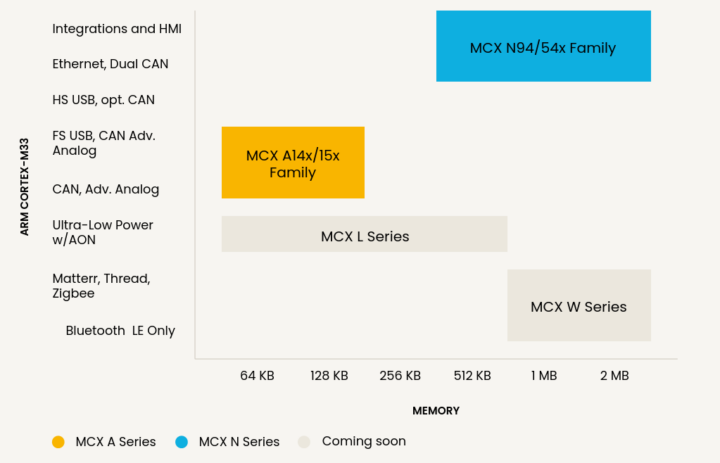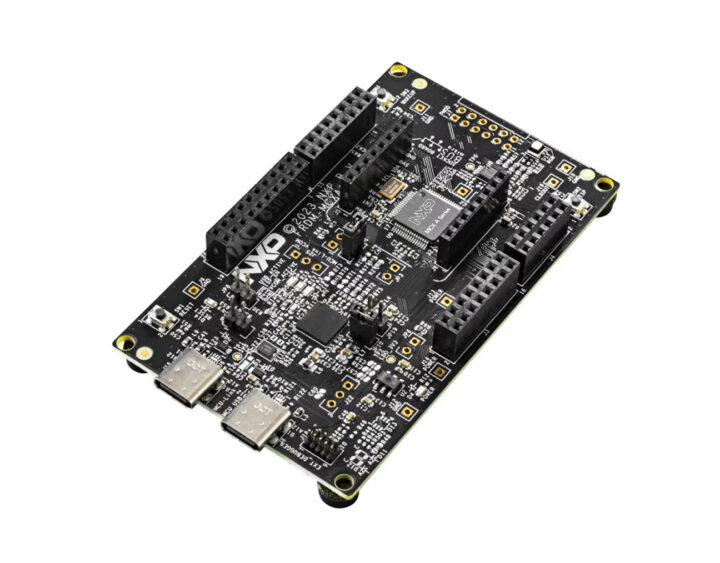NXP has just announced the launch of the MCX A series Arm Cortex-M33 microcontrollers with the MCX A14x running up to 48 MHz and the MCX A15x running up to 96 MHz. The devices support up to 128KB flash and 32KB SRAM, offer I2C, I3C, and SPI sensor interfaces, and integrate support for BLDC/PMSM motor control.
NXP first unveiled the NXP MCX general-purpose Arm MCU family with 30 times faster machine learning at Embedded World 2022, but at the time we had limited information although four series were planned with the MCX N Advanced series up to 250 MHz, the MCX A essential series up to 96 MHz, the MCX W Wireless series with Bluetooth LE, and the MCX L Low-power series. The MCX A series has just been launched, and the high-end MCX N also has its own product page with the N94x and N54x variants. We’ll focus on the MCX A14x and A15x microcontrollers and development boards in this post.
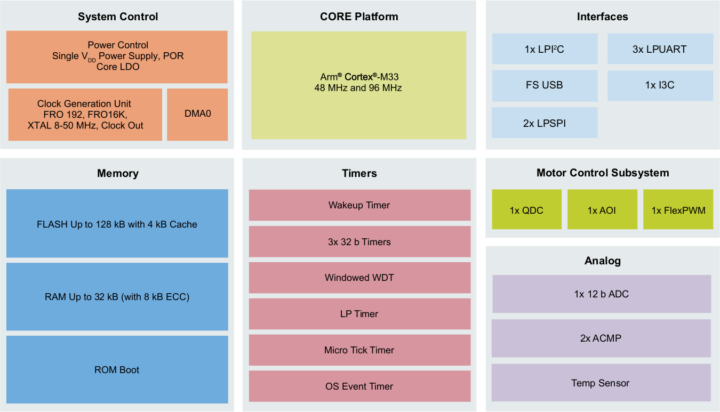
Specifications:
- MCU core – Arm Cortex-M33 up to 48 MHz (A14x) or 96 MHz (A15x)
- Memory – Up to 32 KB RAM, configurable as up to 8 KB with ECC (support single-bit correction two bits detection);
- Storage – Up to 128 KB on-chip Flash with ECC (one-bit correction and two bits detection); flash swap support with 8 KB granularity; cache engine with 4 KB RAM
- Peripherals
- USB – 1x USB 2.0 full-speed device controller with on-chip PHY supporting crystal-less operation in device mode
- Up to 52x GPIOs
- Sensor interfaces
- 2x LPSPI modules, supporting up to 50MHz operation frequency in master mode
- 1x LPI2C supporting standard, fast, fast+ and ultra-fast modes
- 3x LPUART
- 1x I3C bus interface
- Analog
- 12-bit ADC with a sample rate of 4.0 Msamples/sec in 12-bit mode and support for 16-bit mode with reduced bandwidth. Up to 24x ADC Input channels with multiple internal and external trigger inputs. Integrated temperature sensor
- 2x High-speed comparators with 8 input pins and an 8-bit DAC as internal reference
- Motor Control Subsystem
- 1x FlexPWM with 3 submodules, providing 9x PWM outputs
- 1x Quadrature Decoder (QDC) providing interfacing capability to position/speed sensors used in industrial motor control applications
- 1x AOI (AND/OR/INVERT)
- Timers
- 3x 32-bit standard general-purpose asynchronous timers/counters each with four capture inputs and four compare outputs; specific timer events can be selected to generate DMA requests
- LPTimer
- Frequency measurement timer
- Windowed Watchdog Timer (WWT)
- Wake timer
- MicroTick timer that runs from the 1MHz clock used to wake up the device from reduced power modes up to deep sleep with Flash off
- 42-bit free running OS timer as a continuous time base for the system (available in any reduced power modes)
- Security
- Life cycle management
- Protected Flash providing read/write/execute/Lock control per flash sector
- 128-bit Universal Unique Identifier (UUID) per device in accordance with IETF’s RFC4122 version 5 specification
- Code Watchdog for code flow integrity checking
- Code Read Out Protection (RoP) from flash with 3 levels of factory access control to customize returns handling
- Glitch attack resistant keyed access (Glikey) to critical control registers
- Operating voltage – 1.71 V to 3.6 V
- Power consumption
- 59 μA/MHz active current
- 6.5 μA power-down mode with all SRAM retention
- 394 nA Deep Power-down mode
- Package – 64LQFP, 10x10mm (52x GPIOs); 32QFN, 5x5mm (41x GPIOs); 48QFN, 7x7mm (26x GPIOs)
- Temperature Range – -40°C to +125°C
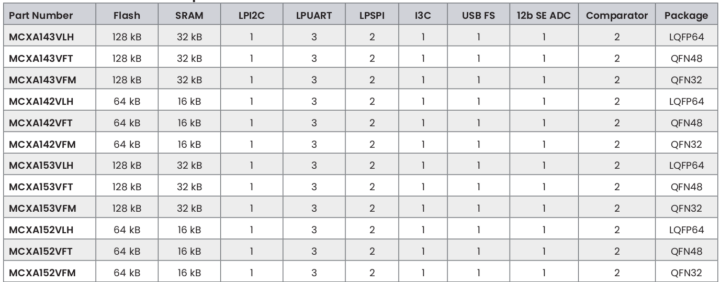
Based on my look at the specifications and datasheet, the only difference between A14x and A15x is indeed to max frequency (48 MHz vs 96 MHz) and both are offered with the same range of packages through A142/A413 and A152/A154 microcontrollers. Parts A1x3 parts come with 128KB flash, while A1x2 parts only feature 64KB.
While the MCX N series is suitable for HMI and Ethernet communication applications with higher memory requirements, the MCX A series looks to be cost-optimized and NXP says it offers a ” good balance between cost, performance, and power consumption”. The peripherals are autonomous meaning they can take the load off the Cortex-M33 core when it is in sleep mode for power-saving.
Software development can be done through the MCUXpresso IDE and SDK with support for secure provisioning, configuration tools, and Zephyr RTOS. Code samples can be found in the new Application Code Hub. NXP also launched the FRDM-MCXA153 development board for evaluation and early firmware development.
- Microcontroller – NXP MCXA15x Arm Cortex-M33 core with up to 128KB flash, up to 32 kB RAM with 8kB ECC
- USB – 1x USB Type-C FS (host/device) USB port connected to MCU-Link, 1x USB Type-C HS host connector
- Sensor – P3T1755DPJ I3C/I2C temp sensor
- Expansion for SPI/I2C/UART and WiFi
- Arduino Header
- FRDM Header
- Pmod DNP
- mikroBUS socket
- Debug
- On-board MCU-Link debugger with CMSIS-DAP
- JTAG/SWD connector
- Misc – 1x user RGB LED; Reset, ISP, and wake-up buttons
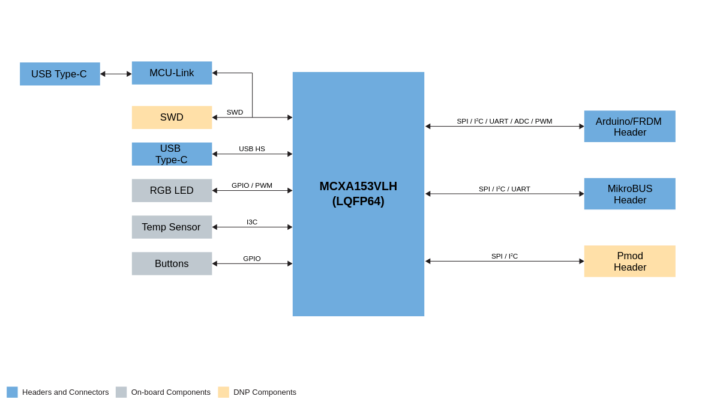
Target applications for the MCX A14x and A15x microcontroller include industrial and consumer IoT devices, industrial communications, Smart Metering, motor control, automation & control, and sensors. Pricing starts at 92 cents per unit for 10K orders, while the FRDM-MCXA152 development board only costs $15 with a USB-C cable and a quick start guide. You’ll find more details including documentation, software development tools, and purchase links on the product page. A few more details may also be found in the press release.

Jean-Luc started CNX Software in 2010 as a part-time endeavor, before quitting his job as a software engineering manager, and starting to write daily news, and reviews full time later in 2011.
Support CNX Software! Donate via cryptocurrencies, become a Patron on Patreon, or purchase goods on Amazon or Aliexpress


